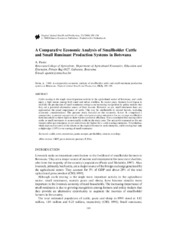| dc.description.abstract | Cattle rearing is the single most important activity in the agricultural sector of Botswana, and cattle enjoy a high status among both rural and urban dwellers. In recent years, farmers have begun to intensify the production of small ruminants owing to an increasing recognition by policy makers that they are a potential alternative source of farm income. However, as yet, small ruminants have not approached the social importance of cattle. This may be attributable to several factors, including economic considerations. The present study focused on the economic factor. It comprised a comparative economic assessment of cattle- and goat-rearing enterprises for an average smallholder farm-household to throw light on their relative economic efficiency. It was concluded that rearing either cattle or small ruminants is economically viable in the study area. The net profit measured as the net margin either per enterprise or per animal was far higher for a cattle-rearing enterprise. Nevertheless, when expressed in terms of the return on the capital invested in each enterprise, cattle rearing had only a slight edge (1.93%) over rearing of small ruminants. | en_US |

